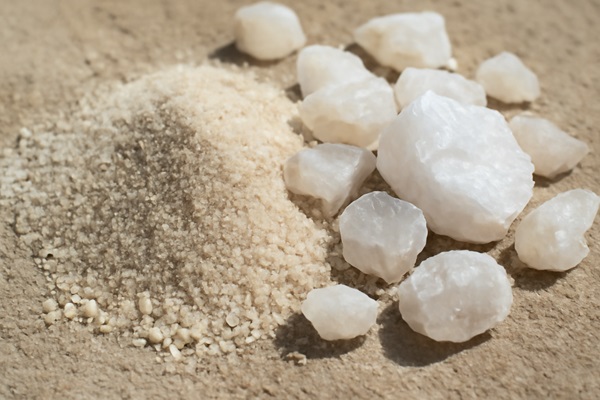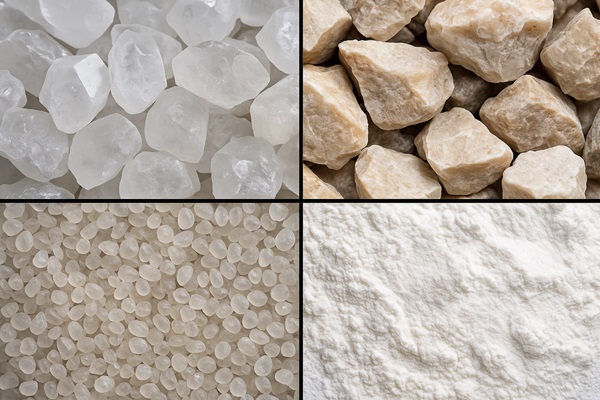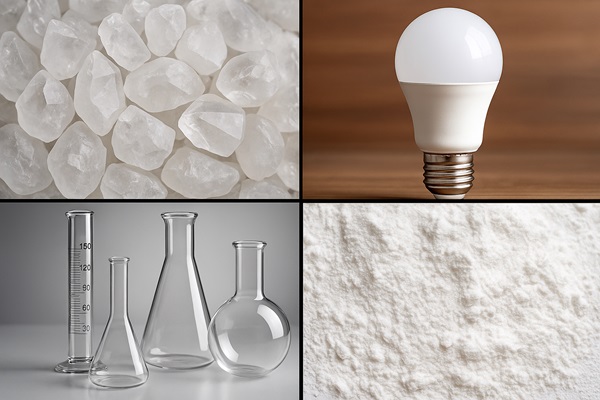سیلیس چیست؟ مادهای استراتژیک در صنایع مختلف
سیلیس یکی از مهمترین و پرکاربردترین مواد معدنی در جهان است که حضور آن در صنایع مختلف بهقدری گسترده است که کمتر صنعتی را میتوان یافت که بهنوعی از این ماده بینیاز باشد. وقتی از خودمان میپرسیم سیلیس چیست، در واقع به دنبال شناخت مادهای هستیم که در ساخت شیشه، بتن، سرامیک، ریختهگری، فیلتراسیون آب، رنگسازی و حتی صنایع پیشرفته الکترونیک نقشی کلیدی ایفا میکند. سیلیس به دلیل ساختار شیمیایی پایدار، مقاومت بالا و قابلیت ترکیب با مواد گوناگون، جایگاه ویژهای در میان مواد معدنی پیدا کرده است.
از نگاه علمی، سیلیس ترکیبی از عنصر سیلیکون (Si) و اکسیژن (O₂) است که با فرمول شیمیایی SiO₂ شناخته میشود. این ماده به شکلهای مختلفی در طبیعت وجود دارد؛ از شن و ماسهی معمولی گرفته تا کریستالهای شفاف کوارتز. همین تنوع شکل و خلوص، باعث شده سیلیس در ردهی پرمصرفترین مواد معدنی جهان قرار بگیرد. جالب است بدانید که بیش از ۲۵ درصد پوسته زمین از سیلیس تشکیل شده و این یعنی تقریباً همهجا حضور دارد؛ اما تنها نوع خاصی از آن که خلوص بالا داشته باشد، در صنایع حساس مورد استفاده قرار میگیرد.
سیلیس علاوه بر فراوانی، به دلیل خواص منحصربهفردی همچون سختی بالا، نقطه ذوب زیاد، پایداری شیمیایی و قابلیت شکلدهی، به یکی از مواد معدنی استراتژیک تبدیل شده است. همین ویژگیهاست که باعث شده این ماده در مقیاس جهانی ارزش اقتصادی بالایی پیدا کند و بهعنوان پایه بسیاری از صنایع مدرن مطرح باشد.

سیلیس چیست و چه ویژگیهایی دارد؟
سیلیس به دلیل ترکیب شیمیایی و ساختار مولکولی خود، ویژگیهایی منحصربهفرد دارد که آن را از بسیاری مواد معدنی دیگر متمایز میکند. این خصوصیات نه تنها در تعریف علمی سیلیس اهمیت دارند، بلکه دلیل اصلی استفاده گسترده از آن در صنایع مختلف نیز محسوب میشوند.
از نظر فیزیکی، سیلیس سختی بالایی دارد و در مقیاس موس، درجه سختی آن حدود ۷ است. همین خاصیت موجب شده تا در برابر سایش و خراش مقاومت بالایی از خود نشان دهد. همچنین نقطه ذوب سیلیس بسیار بالا بوده و حدود ۱۷۱۰ درجه سانتیگراد است؛ بنابراین در فرآیندهایی که دماهای بالا وجود دارد، مانند صنایع ریختهگری و تولید شیشه، انتخابی ایدهآل محسوب میشود. شفافیت و درخشندگی برخی از انواع سیلیس، مخصوصاً کوارتز، نیز باعث شده تا در صنایع تزئینی و ساخت تجهیزات اپتیکی مورد استفاده قرار گیرد.
از نظر شیمیایی، سیلیس ترکیبی پایدار است و بهراحتی با اکثر مواد واکنش نشان نمیدهد. این پایداری باعث میشود در محیطهای شیمیایی سخت، مانند اسیدها یا شرایط خورنده، عملکرد قابل قبولی داشته باشد. با این حال، سیلیس در برابر اسید هیدروفلوئوریک واکنشپذیر است و به همین دلیل در فرآیندهای خاص شیمیایی باید به این نکته توجه داشت. یکی دیگر از ویژگیهای مهم سیلیس، خاصیت عایق بودن آن است؛ یعنی انتقال حرارت و الکتریسیته را بهخوبی انجام نمیدهد و همین موضوع، آن را به مادهای کلیدی در صنایع الکترونیک و نسوز تبدیل کرده است.
این مجموعه ویژگیهای فیزیکی و شیمیایی باعث شده سیلیس بهعنوان مادهای چندمنظوره و استراتژیک شناخته شود؛ مادهای که هم در پروژههای عمرانی عظیم کاربرد دارد و هم در صنایع پیشرفته فناوریهای نوین.

انواع سیلیس
سیلیس در طبیعت به شکلها و کیفیتهای متفاوتی یافت میشود که هرکدام ویژگیها و کاربردهای خاص خود را دارند. شناخت انواع سیلیس به صنایع کمک میکند تا بر اساس نیاز، نوع مناسب را انتخاب کنند. مهمترین دستهبندیهای سیلیس عبارتاند از:
سیلیس کریستالی
یکی از رایجترین انواع سیلیس، سیلیس کریستالی است که در طبیعت بهصورت کانیهای مختلف مانند کوارتز، کریستوبالیت و تریدیمیت یافت میشود. این نوع سیلیس به دلیل سختی و شفافیت بالا، در صنایع شیشهسازی، سرامیک، و همچنین در تولید ابزارهای برش و سایش به کار میرود. کوارتز بهعنوان شناختهشدهترین شکل کریستالی سیلیس، هم در کاربردهای صنعتی و هم در تزئینات و جواهرسازی جایگاه ویژهای دارد.
سیلیس آمورف (بیشکل)
سیلیس آمورف ساختار منظم کریستالی ندارد و معمولاً به شکل پودرهای ریز یا دانههای شیشهای مشاهده میشود. این نوع سیلیس بیشتر در صنایع شیمیایی، تولید لاستیک، رنگسازی و حتی صنایع غذایی مورد استفاده قرار میگیرد. خاصیت جذب بالا و سطح ویژه زیاد، سیلیس آمورف را به گزینهای پرکاربرد در فرآیندهای صنعتی تبدیل کرده است.
سیلیس دانهبندیشده
این نوع سیلیس پس از استخراج، طی فرآیند خردایش و دانهبندی، به اندازههای مختلف تبدیل میشود. سیلیس دانهبندیشده به دلیل کنترل اندازه ذرات، در صنایع فیلتراسیون آب، سندبلاست و حتی تولید بتن نقش مهمی ایفا میکند. استفاده از این نوع سیلیس در سیستمهای تصفیه آب، بهویژه در صنایع بهداشتی و غذایی، اهمیت بالایی دارد.
میکروسیلیس (سیلیس دود)
میکروسیلیس که بهعنوان Silica Fume نیز شناخته میشود، یک پودر بسیار ریز با قطر ذرات نانومتری است. این نوع سیلیس محصول جانبی صنایع ذوب فلزات سیلیکونی بوده و در بتنهای پرمقاومت و پروژههای عمرانی بزرگ به کار میرود. اضافه کردن میکروسیلیس به بتن باعث افزایش استحکام، کاهش نفوذپذیری و افزایش عمر سازه میشود.
سایر نوع سیلیس های دیگر
به جز موارد فوق، سیلیس میتواند در اشکال دیگری مانند ژل سیلیکا (Silica Gel) یا سیلیس پر شده در صنایع دارویی و غذایی نیز یافت شود. این اشکال خاص معمولاً در کاربردهای تخصصیتر و محدودتر استفاده میشوند.
کاربردهای سیلیس در صنایع مختلف
سیلیس به دلیل ویژگیهای منحصربهفرد خود، از سختی بالا گرفته تا مقاومت شیمیایی و قابلیت شکلگیری، در طیف گستردهای از صنایع مورد استفاده قرار میگیرد. در ادامه به مهمترین کاربردهای سیلیس در بخشهای مختلف صنعتی میپردازیم:
کاربرد سیلیس در صنعت ساختمان و بتن
در پروژههای عمرانی و ساختمانی، سیلیس نقش بیبدیلی دارد. میکروسیلیس بهعنوان افزودنی بتن، باعث افزایش مقاومت فشاری و خمشی بتن میشود و از نفوذ آب و مواد خورنده به داخل سازه جلوگیری میکند. استفاده از این ماده در سدسازی، پلها و سازههای دریایی به افزایش طول عمر و کاهش هزینههای نگهداری کمک میکند.
کاربرد سیلیس در صنایع شیشه و سرامیک
یکی از شناختهشدهترین کاربردهای سیلیس، در تولید شیشه و سرامیک است. سیلیس با خلوص بالا بهعنوان ماده اصلی در تولید شیشههای ساختمانی، ظروف شیشهای، شیشههای اپتیکی و حتی فیبر نوری به کار میرود. در صنعت سرامیک نیز بهعنوان یکی از اجزای اصلی خاک نسوز، استحکام و دوام محصولات را افزایش میدهد.
کاربرد سیلیس در ریختهگری و صنایع فلزی
سیلیس در صنعت ریختهگری بهعنوان قالب ماسهای استفاده میشود. دانهبندی کنترلشده این ماده موجب میشود که قالبها شکل دقیق قطعه را به خود بگیرند. در صنایع فولاد و فلزات غیرآهنی نیز سیلیس نقش نسوز دارد و بهعنوان پوشش یا آستر کورهها استفاده میشود.
کاربرد سیلیس در فیلتراسیون آب
یکی از رایجترین مصارف سیلیس، در تصفیه آب و فاضلاب است. سیلیس دانهبندیشده در فیلترهای شنی برای حذف ذرات معلق، کدورت و آلایندهها به کار میرود. این کاربرد بهویژه در صنایع غذایی، نوشیدنیها و تصفیهخانههای شهری اهمیت زیادی دارد.
کاربرد سیلیس در صنایع نفت، رنگ و شیمیایی
سیلیس در صنایع نفت و گاز بهعنوان مادهای مقاوم در برابر فشار و دما به کار گرفته میشود. در صنعت رنگ نیز بهعنوان پرکننده و افزایشدهنده دوام و مقاومت پوششها نقش مهمی دارد. همچنین در تولید لاستیک، مواد شوینده و محصولات شیمیایی، سیلیس یکی از افزودنیهای پرکاربرد محسوب میشود.

مزایا و محدودیتهای استفاده از سیلیس
سیلیس به دلیل ویژگیهای منحصربهفردش، یکی از مواد معدنی کلیدی در صنایع مختلف است. اما مثل هر ماده دیگری، علاوه بر مزایا، محدودیتهایی نیز دارد که شناخت آنها به انتخاب درستتر کمک میکند.
مزایای استفاده از سیلیس
- وفور در طبیعت: سیلیس یکی از فراوانترین مواد معدنی در پوسته زمین است، بنابراین دسترسی به آن آسان بوده و هزینه استخراج نسبتاً پایین است.
- سختی و مقاومت بالا: سختی ۷ در مقیاس موس و مقاومت در برابر سایش باعث میشود در صنایع ساختمانی و ریختهگری عملکرد عالی داشته باشد.
- پایداری شیمیایی: سیلیس بهسختی با مواد شیمیایی واکنش میدهد و همین موضوع آن را به مادهای مقاوم در برابر شرایط خورنده تبدیل میکند.
- نقطه ذوب بالا: با دمای ذوب حدود ۱۷۱۰ درجه سانتیگراد، سیلیس انتخابی ایدهآل برای صنایع نسوز و کورهها است.
- تنوع کاربرد: از بتنسازی و شیشهسازی گرفته تا فیلتراسیون آب، صنایع نفت و حتی الکترونیک، سیلیس حضوری گسترده دارد.
- قیمت مقرونبهصرفه: به دلیل وفور و گستردگی منابع، هزینه تمامشده سیلیس در مقایسه با مواد جایگزین پایینتر است.
محدودیتها و چالشها
- نیاز به خلوص بالا: در برخی صنایع مانند تولید شیشه اپتیکی یا الکترونیک، فقط سیلیس با خلوص بسیار بالا قابل استفاده است که تهیه آن هزینهبر است.
- مخاطرات بهداشتی: گرد و غبار حاصل از سیلیس میتواند برای ریهها مضر باشد و در صورت تماس طولانیمدت منجر به بیماری سیلیکوزیس شود؛ بنابراین استفاده از تجهیزات ایمنی الزامی است.
- واکنشپذیری محدود: با وجود پایداری شیمیایی بالا، سیلیس در برابر اسید هیدروفلوئوریک مقاوم نیست و این موضوع در برخی کاربردها محدودیت ایجاد میکند.
- وابستگی به فرآوری مناسب: کیفیت نهایی سیلیس بستگی زیادی به فرآوری و دانهبندی دقیق دارد؛ در غیر این صورت، در صنایع حساس قابل استفاده نخواهد بود.
تفاوت سیلیس داخلی و وارداتی
بازار سیلیس در ایران ترکیبی از تولیدات داخلی و محصولات وارداتی است. هرکدام از این دو دسته ویژگیها، مزایا و محدودیتهای خاص خود را دارند و انتخاب بین آنها معمولاً به نیاز صنعت، سطح خلوص مورد انتظار و بودجه خریدار بستگی دارد.
سیلیس داخلی
ایران به دلیل دارا بودن ذخایر غنی معدنی، یکی از تولیدکنندگان مهم سیلیس در منطقه است. سیلیس داخلی معمولاً بهصورت دانهبندیشده، پودر میکرونیزه و میکروسیلیس در بازار عرضه میشود. مزیت اصلی سیلیس داخلی، دسترسی آسان، قیمت مقرونبهصرفه و زمان تحویل کوتاه است. بسیاری از صنایع ساختمانی، ریختهگری و فیلتراسیون، بهراحتی میتوانند نیازهای خود را از منابع داخلی تأمین کنند. با این حال، در برخی موارد خلوص سیلیس داخلی پایینتر از استانداردهای موردنیاز صنایع حساس مانند شیشهسازی اپتیک یا الکترونیک است.
سیلیس وارداتی
سیلیس وارداتی اغلب از کشورهایی مانند چین، هند و ترکیه وارد میشود. این محصولات معمولاً دارای درجه خلوص بالاتر و کنترل کیفیت دقیقتر هستند. صنایع خاصی که به سیلیس با کیفیت بسیار بالا نیاز دارند، مانند تولید فیبر نوری، الکترونیک یا شیشههای خاص، ترجیح میدهند از سیلیس وارداتی استفاده کنند. نقطه ضعف اصلی سیلیس وارداتی، هزینه بالاتر و وابستگی به شرایط بازار جهانی و نوسانات نرخ ارز است.
مقایسه و انتخاب بهتر
- برای صنایع عمومی مانند ساختمان، فیلتراسیون آب یا ریختهگری: سیلیس داخلی انتخابی مقرونبهصرفه و در دسترس است.
- برای صنایع حساس و فناوریهای پیشرفته: سیلیس وارداتی به دلیل خلوص بالاتر ترجیح داده میشود.
- در بسیاری از پروژهها نیز ترکیبی از هر دو نوع سیلیس مورد استفاده قرار میگیرد تا هم هزینهها کنترل شود و هم کیفیت مورد نیاز تأمین گردد.
بازار سیلیس ایران و جهان (قیمت، تولید و صادرات)
سیلیس بهعنوان یکی از پرمصرفترین مواد معدنی در دنیا، بازاری گسترده و پویا دارد. به دلیل کاربرد وسیع این ماده در صنایع ساختمانی، شیشهسازی، ریختهگری، نفت و حتی فناوریهای نوین، تقاضا برای آن همواره رو به افزایش است.
بازار سیلیس در ایران
ایران با داشتن ذخایر غنی معدنی، یکی از تولیدکنندگان اصلی سیلیس در منطقه محسوب میشود. معادن متعددی در استانهایی مانند همدان، سمنان، اصفهان و یزد فعالیت دارند که بخش بزرگی از نیاز داخلی را تأمین میکنند. قیمت سیلیس در ایران معمولاً به عواملی مانند خلوص، دانهبندی، نوع فرآوری و محل معدن بستگی دارد. برای مثال، سیلیس دانهبندیشده با خلوص متوسط هزینهای کمتر دارد، در حالیکه میکروسیلیس یا سیلیس با خلوص بالا در صنایع خاص، قیمت بالاتری پیدا میکند.
بازار جهانی سیلیس
در سطح جهان، کشورهایی مانند چین، هند، آمریکا و ترکیه جزو تولیدکنندگان و صادرکنندگان اصلی سیلیس هستند. تقاضای جهانی برای سیلیس در سالهای اخیر به دلیل توسعه صنایع الکترونیک، فیبر نوری و بتنهای پرمقاومت رشد چشمگیری داشته است. بر اساس گزارشهای بینالمللی، ارزش بازار جهانی سیلیس تا سالهای آینده با نرخ رشد ثابت افزایش خواهد یافت.
صادرات سیلیس ایران
به دلیل کیفیت بالای برخی معادن ایرانی، صادرات سیلیس به کشورهای همسایه و حتی بازارهای اروپایی در حال گسترش است. سیلیس ایرانی بهویژه در شکل دانهبندیشده و میکروسیلیس در بازارهای خارجی تقاضای بالایی دارد. با این حال، چالشهایی مثل هزینه حملونقل، فرآوری محدود در برخی معادن و نوسانات نرخ ارز میتوانند بر رقابتپذیری صادراتی تأثیر بگذارند.
جمعبندی بازار
- ایران پتانسیل بالایی برای تبدیل شدن به یکی از قطبهای صادرات سیلیس در منطقه دارد.
- قیمت سیلیس هم در ایران و هم در جهان وابسته به کیفیت، خلوص و روش فرآوری است.
- افزایش تقاضای جهانی برای سیلیس در صنایع نوین، فرصت مناسبی برای توسعه بازار داخلی و صادراتی ایجاد کرده است.
روشهای استخراج و فرآوری سیلیس
سیلیس یکی از مواد معدنی پرکاربرد است که استخراج و فرآوری صحیح آن، نقش مهمی در کیفیت نهایی و میزان خلوص محصول دارد. بسته به نوع معدن و کاربرد موردنظر، روشهای استخراج و فرآوری متفاوتی به کار گرفته میشود.
استخراج سیلیس
سیلیس معمولاً به شکل سنگ کوارتز یا ماسههای سیلیسی در طبیعت وجود دارد. مراحل کلی استخراج شامل:
- استخراج روباز: در معادن ماسه سیلیسی، برداشت معمولاً به روش روباز انجام میشود. لایههای سطحی زمین برداشته شده و ماسههای سیلیسی مستقیماً جمعآوری میگردند.
- استخراج از کوارتز سنگی: در مناطقی که سیلیس به شکل سنگ کوارتز یافت میشود، عملیات انفجار، خردایش و جداسازی برای دستیابی به سنگ خام انجام میشود.
- جداسازی ناخالصیها: در مرحله اولیه استخراج، ناخالصیهایی مانند رس، اکسیدهای آهن و سایر مواد همراه باید از سیلیس جدا شوند تا کیفیت بالاتری حاصل گردد.
فرآوری سیلیس
پس از استخراج، سیلیس خام نیاز به فرآوری دارد تا به شکل مطلوب برای صنایع مختلف برسد. مراحل اصلی فرآوری عبارتاند از:
- شستوشو و غربالگری: برای حذف رس و مواد ریزدانه، سیلیس شسته و سپس بر اساس اندازه دانهها دانهبندی میشود.
- خردایش: در صورت نیاز، سیلیس استخراجشده وارد دستگاههای سنگشکن میشود تا به ذرات کوچکتر تبدیل گردد.
- دانهبندی و طبقهبندی: ذرات سیلیس بر اساس اندازه، بهصورت دقیق دانهبندی میشوند. این مرحله اهمیت ویژهای برای صنایع فیلتراسیون و ریختهگری دارد.
- میکرونیزه کردن: در کاربردهایی مثل تولید رنگ، لاستیک و مواد شیمیایی، سیلیس باید به پودر بسیار ریز یا میکرونیزه تبدیل شود.
- خالصسازی: برای صنایع حساس مانند شیشهسازی یا تولید فیبر نوری، خلوص سیلیس اهمیت بالایی دارد. در این موارد، از روشهای شیمیایی و فیزیکی برای کاهش ناخالصیها و افزایش درصد SiO₂ استفاده میشود.
اهمیت فرآوری صحیح
فرآوری مناسب سیلیس نه تنها کیفیت محصول را ارتقا میدهد، بلکه باعث افزایش کارایی در صنایع مختلف میشود. بهطور مثال، سیلیس با دانهبندی دقیق در فیلتراسیون آب عملکرد بهتری دارد، یا سیلیس میکرونیزه در بتن و رنگ موجب افزایش مقاومت و دوام میگردد.
ایمنی و نکات زیستمحیطی در کار با سیلیس
سیلیس به دلیل کاربردهای گستردهاش در صنایع مختلف، همواره مورد توجه تولیدکنندگان و مصرفکنندگان است؛ اما کار با این ماده بدون رعایت اصول ایمنی و ملاحظات زیستمحیطی میتواند چالشهایی به همراه داشته باشد. به همین دلیل، آشنایی با خطرات احتمالی و رعایت استانداردهای ایمنی ضروری است.
مخاطرات بهداشتی سیلیس
مهمترین خطری که سیلیس میتواند برای سلامت انسان ایجاد کند، استنشاق گرد و غبار سیلیس است. قرار گرفتن طولانیمدت در معرض ذرات ریز سیلیس میتواند منجر به بیماریای به نام سیلیکوزیس شود؛ بیماریای ریوی که بهتدریج عملکرد ریهها را کاهش میدهد. علاوه بر این، برخی تحقیقات نشان دادهاند که تماس زیاد با گرد سیلیس ممکن است خطر ابتلا به بیماریهای تنفسی مزمن و حتی سرطان ریه را افزایش دهد.
برای کاهش این خطرات، استفاده از تجهیزات حفاظت فردی مانند ماسکهای فیلتردار، عینک ایمنی و سیستمهای تهویه مناسب در محیطهای کاری الزامی است. همچنین آموزش کارکنان و نظارت بر رعایت اصول ایمنی میتواند تا حد زیادی از بروز مشکلات جلوگیری کند.
ملاحظات زیستمحیطی
فعالیتهای استخراج و فرآوری سیلیس میتوانند اثرات زیستمحیطی متعددی داشته باشند. برداشت بیرویه از معادن ممکن است به فرسایش خاک، تخریب پوشش گیاهی و تغییر در اکوسیستمهای محلی منجر شود. علاوه بر این، تولید گرد و غبار و پسابهای صنعتی حاصل از شستوشوی سیلیس، در صورت مدیریت نادرست، میتواند کیفیت هوا و منابع آبی را تهدید کند.
به همین دلیل، رعایت استانداردهای زیستمحیطی و استفاده از فناوریهای نوین در استخراج و فرآوری سیلیس اهمیت زیادی دارد. روشهایی مانند بازچرخانی آب در کارخانههای فرآوری، کنترل انتشار گرد و غبار، و بازسازی اراضی پس از بهرهبرداری از معدن، از جمله اقداماتی است که میتواند اثرات منفی زیستمحیطی را به حداقل برساند.
اهمیت رعایت اصول ایمنی
رعایت نکات ایمنی و زیستمحیطی نه تنها باعث حفاظت از سلامت کارگران و جوامع محلی میشود، بلکه در بلندمدت به نفع صنایع نیز هست. چراکه استفاده پایدار و مسئولانه از منابع معدنی میتواند اعتبار برند و جایگاه شرکتها را در بازارهای داخلی و بینالمللی ارتقا دهد.
نتیجهگیری
سیلیس یکی از مواد معدنی کلیدی و استراتژیک است که حضور آن در صنایع مختلف از ساختمان و شیشهسازی گرفته تا الکترونیک و فیلتراسیون، غیرقابلانکار است. ویژگیهایی مانند سختی بالا، پایداری شیمیایی، نقطه ذوب زیاد و قابلیت استفاده در شکلها و دانهبندیهای متنوع، سیلیس را به مادهای منحصربهفرد تبدیل کرده است.
ایران با داشتن ذخایر غنی سیلیس، ظرفیت بزرگی برای تأمین نیاز داخلی و توسعه صادرات دارد. با این حال، توجه به کیفیت، فرآوری دقیق، رعایت اصول ایمنی و ملاحظات زیستمحیطی، از الزامات اساسی برای بهرهبرداری پایدار از این منبع ارزشمند است.
اگر به دنبال خرید سیلیس برای صنایع خود هستید، باید با در نظر گرفتن نوع کاربرد، کیفیت و خلوص موردنیاز، بهترین انتخاب را بین منابع داخلی و وارداتی داشته باشید. آینده بازار سیلیس نشان میدهد که این ماده همچنان نقش محوری در صنایع مدرن خواهد داشت.
سوالات متداول درباره سیلیس
سیلیس چیست و از چه چیزی تشکیل شده است؟
سیلیس یک ترکیب شیمیایی از سیلیکون و اکسیژن (SiO₂) است که بهصورت کریستالی یا آمورف در طبیعت یافت میشود و در صنایع مختلف کاربرد دارد.
مهمترین کاربردهای سیلیس کداماند؟
سیلیس در صنایع بتن، شیشهسازی، ریختهگری، فیلتراسیون آب، صنایع نفت و حتی الکترونیک استفاده میشود.
فرق سیلیس داخلی و وارداتی چیست؟
سیلیس داخلی به دلیل دسترسی آسان و قیمت مناسب برای صنایع عمومی مثل ساختمان و فیلتراسیون مناسب است، در حالی که سیلیس وارداتی معمولاً خلوص بالاتر دارد و برای صنایع حساس مثل شیشه اپتیکی و فیبر نوری استفاده میشود.
آیا کار با سیلیس خطرناک است؟
بله، استنشاق گرد و غبار سیلیس میتواند برای ریهها مضر باشد و باعث بیماری سیلیکوزیس شود؛ به همین دلیل استفاده از تجهیزات ایمنی الزامی است.
قیمت سیلیس چگونه تعیین میشود؟
قیمت سیلیس به عواملی مثل خلوص، نوع (دانهبندیشده، میکرونیزه، میکروسیلیس)، فرآوری و محل معدن بستگی دارد.
